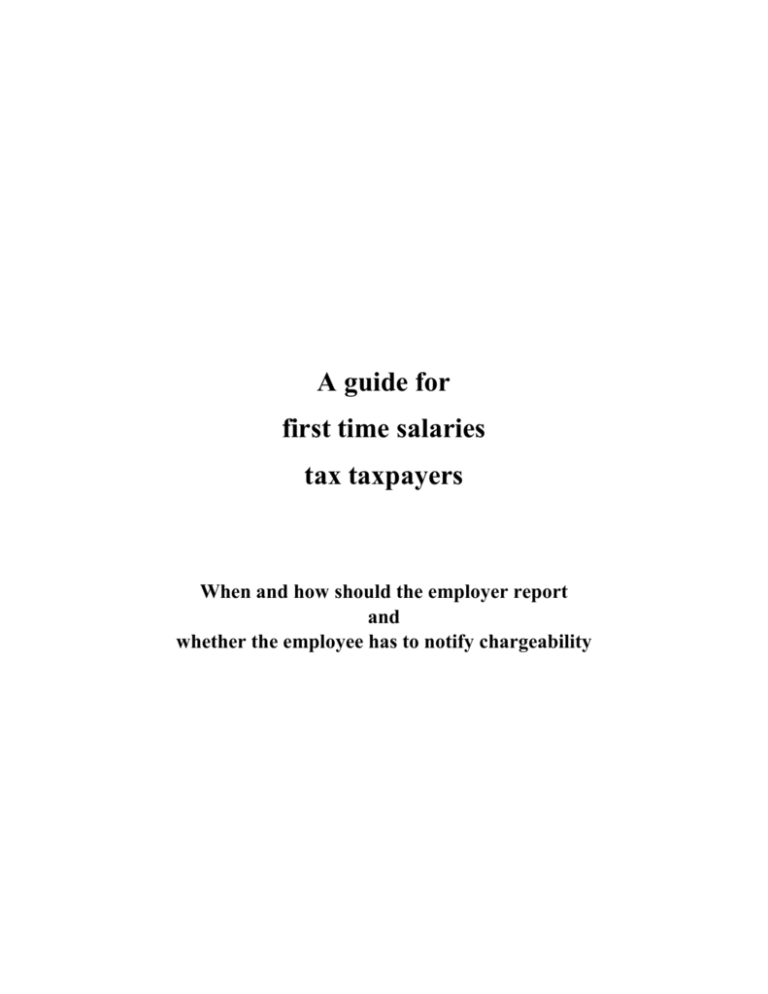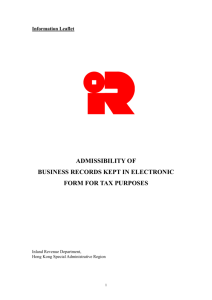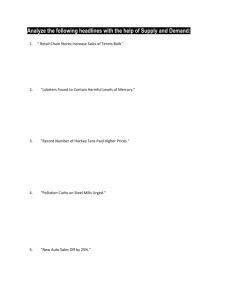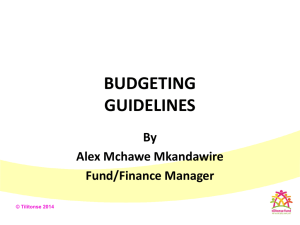A guide for first time salaries tax taxpayers
advertisement

A guide for first time salaries tax taxpayers When and how should the employer report and whether the employee has to notify chargeability Foreword If you have recently joined the work force, you may need to pay Salaries Tax on your employment income. This leaflet helps answer some of the questions you may have concerning Salaries Tax. Common questions and answers 1. I started working in the year 2014. How do I report and how often do I need to report my income to the Inland Revenue Department (IRD)? To what must I pay attention, most of all? In Hong Kong, Salaries Tax is assessed by the year of assessment on the actual basis; a year of assessment means a period of 12 months, from 1April to the 31 March of the following year; usually taxpayers furnish annual tax returns on income; taxpayers whose income is below their entitlement to allowances do not have to pay tax (exempt); and they do not have to report their earnings to the IRD unless they receive a tax return (in which case they must report and report in time); and taxpayers may be required to pay Provisional Salaries Tax. If you are liable or likely liable to Salaries Tax, the IRD will send you a Tax Return – Individuals (Form BIR60) for completion. If you commenced working before 1 April 2014, your income for the first 3 years should be reported, as follows – Tax return for year of assessment 2013/14 2014/15 2015/16 With employment income for period Commencement date of employment to 31.3.2014 1.4.2014 to 31.3.2015 1.4.2015 to 31.3.2016 If you commenced working on 18 August 2014, you would complete – Tax return for year of assessment 2014/15 2015/16 2. With employment income for period 18.8.2014 to 31.3.2015 1.4.2015 to 31.3.2016 You are normally given one month’s time to complete your tax return. You should note that the law provides for heavy penalties in respect of failure to file a tax return, filing a tax return late, and/or filing an incorrect tax return. Do I have to apply to the IRD for a tax return to report my employment income? In Hong Kong, most salaries earners do not have to apply to the IRD for a tax return. The system of tax returns works like this: Obligation to notify the Commissioner of an employee’s chargeability to Salaries Tax: If you are liable to Salaries Tax, the obligation to notify is as follows – your employer must notify, and you may have to notify. How does an employer notify chargeability: 3 months after employing you, your employer should have reported on a Form IR56E (the green form) to the IRD (with a copy to you) ­ your full name and address, your marital status, and the date of commencement and the terms of your employment. Such information will enable our computer to automatically create a tax file in your name and to issue a tax return (if necessary) to you normally within 5 months. 3. The employee may not be required to notify chargeability, why is this so ? The law provides that if you have received a tax return from the IRD by certain designated date*, you need not notify chargeability. You simply report your income in that tax return. If you are liable to tax and do not receive any tax return, you will have to notify chargeability by the designated date*. * (See answer to Question 3) What if the employee is exempt from tax: you do not have to complete any tax return, unless you receive one from the IRD; and if you do receive a tax return, you must complete and submit it in time. If I am liable to pay tax but do not receive a tax return, do I have to write to the IRD? Yes. If you are liable to pay tax for any year of assessment, the law requires you to furnish a notification of chargeability to the Commissioner by the 31 July of the year following that year of assessment, unless you have already received a tax return. See the following examples – Date of commencement of employment 01.01.2014 18.08.2014 11.04.2015 Liable to tax for year of assessment 2013/14 2014/15 2015/16 If you do not receive a tax return, you must notify the IRD of chargeability to tax by 31.7.2014 31.7.2015 31.7.2016 Your notification should be in writing and include the following information ­ your personal particulars, including your Hong Kong Identity Card number (if any), correspondence address, daytime contact telephone number, marital status and number of dependent children, the name, address, nature of business, business registration number (if known) of your employer, your income for the period to 31 March of the year, whether you have other sources of income, and previous tax file number(s) with the IRD, if any. With this information, the IRD will create a tax file and issue a tax return to you. 4. When will the IRD send me (a first time taxpayer) a tax return? Every year we send tax returns (BIR60) to regular taxpayers on/about the first working day of May. It takes time to create tax files and so there is no fixed date for sending tax returns to first time taxpayers. Tax return is normally issued within 5 months after the receipt of (i) your employer’s notification of your new employment on Form IR56E, or (ii) your letter to notify the Commissioner that you are liable to Salaries Tax. Where appropriate, the first tax return sent to you (a first time taxpayer) may be a BIR60C instead of a BIR60. Example - - - If you joined the workforce on 1 May 2014, Your income for the year of assessment 2014/15 will be for the 11 months to 31 March 2015; a BIR60C may be sent to you within the year 2014 requiring you to report details of income of your new employment; from the information supplied by you in that BIR60C and your employer in the IR56E, the Assessor will make a projection of your income (by estimation) for the 11 months to 31 March 2015, assess Provisional Salaries Tax for the year of assessment 2014/15 and issue to you a demand note; in May 2015, you may receive a BIR60 requiring you to report your actual income for the period to 31 March 2015. You must complete this return, because the Assessor will need the information to compute your final Salaries Tax liability for the year of assessment 2014/15 and the Provisional Salaries Tax for 2015/16; and subsequent tax returns for you, if sent, would probably be sent around the first working day of May. 5. 6. When I report my income on the Tax Return – Individuals (BIR60), do I need to send in any documents to verify my employment income? No, unless you want to claim the whole or part of your employment income as exempt from tax, e.g. by reason that during the year concerned you rendered all your services outside Hong Kong. You are, however, advised to keep the relevant receipts and documents for 6 years after the expiration of the relevant year of assessment (see answer to question 7). What if my employer does not supply me with a copy of the Form IR56 in time to enable me to complete my tax return within one month ? Even in this circumstance you should submit your tax return in time. If you do not have/keep full records of your earnings, you should give an estimate for them the best you can. Subsequently, when you have received a copy of the Form IR56 from your employer, you should cross-check the figures to ensure that you have reported your full income for the year. If you find that you have reported less than the correct amount, you should write to the Commissioner so as to amend your reported earnings. The law requires both the employer and the employee to separately report income to the IRD. Failure by either party to report the full income may result in an understatement of income without reasonable excuse, an act liable to heavy penalty. If you have changed jobs during the year, please be very careful and double-check that you have properly reported your income from all jobs. Oversight is not an acceptable excuse for understating any income in tax returns. The same degree of prudence should apply when you receive an amended/additional Form IR56 (such as that which reports an additional slice of income) from your employer. 7. Do I have to keep records for my income and claimable expenses? Yes, it is recommended that you do. The employee will be assessed by reference to the information received from the employer, the employee and others. If for any reason you consider your income as over-assessed, you should, in writing, raise an objection against the assessment within one month after the date of the notice of assessment and state the grounds of your objection. If you have kept proper records of your income and have retained the relevant documents, you can furnish them as evidence to support a reduction in the assessable income. As regards claims for the deduction of expenses (e.g., donations, self-education expenses and your annual membership subscription to a professional body), as you personally incurred the expenses, you have to provide receipts as evidence for your claim, when required. The consequence for failure to produce the receipts is that ­ your claim for deduction will be rejected, or if the expenses had already been allowed in good faith, the Assessor will withdraw the deductions and issue an additional assessment. You should retain the receipts for a period of 6 years after the expiration of the year of assessment in which the payments were made. You are required to produce receipts if your case is selected for review. 8. Where can I obtain general tax information and advice on how to report my income? You may ­ visit our web site at www.ird.gov.hk; telephone 187 8022; call at the Central Enquiry Counter at 1/F of the Revenue Tower, 5 Gloucester Road, Wan Chai, Hong Kong. [The contents of this leaflet are for general guidance only] PAM 43(e) May 2015








